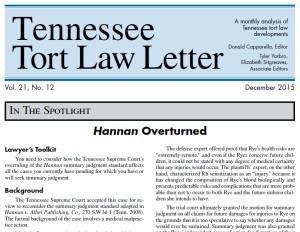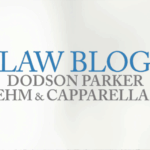Premises Liability Case Falls Short
Premises liability cases are often difficult, and the recent case of Mooney v. Genuine Parts Company d/b/a National Automotive Assoc. illustrates read more
New Dog Bite Case Law in Tennessee
Dog bite cases can be particularly tricky. A recent Tennessee Court of Appeals ruling in the case Moore v. Gaut, No. E2015-00340-COA-R3-CV provides a good overview of the law on the subject and points to the simmering debate of whether specific breeds are inherently dangerous… read more
Examining How Smith v. UHS of Lakeside Is Impacting Summary Judgment
In July 2014, the Tennessee Supreme Court issued its opinion in Smith v. UHS of Lakeside, Inc., 439 S.W.3d 303 (2014). The opinion addressed the correct procedure for a trial court to rule on summary judgment motions. In beginning its analysis, the Supreme Court noted that the appeal required it to address three important procedural principles:
1.) The principle reflected in Tennessee Rule of Civil Procedure 56.04 that a trial court must state the grounds upon which the court denies or grants the motion for summary judgment, which shall be included in the order reflecting the court’s ruling;
2.) The principle that after the court decides the summary judgment ruling, the trial court may authorize counsel to prepare and submit a proposed order for the trial court’s consideration;
3.) The principle that courts speak through their orders, judgments, and minute entries. Id. at 312.
The Court noted that Rule 56.04 was amended in 2002 and 2007 to permit a party to request the trial court to state the legal grounds for its decision and thereafter, to require that the trial court state the legal grounds in both the grant and denial of a motion for summary judgment. Id. at 313. The Court emphasized that the failure to adhere to the Rule complicates the ability of the appellate courts to review the trial court’s decision. Id. The Court went on to address the practice of trial courts requesting and considering proposed orders prepared by the prevailing party. Id. at 316. The Court held that Rule 56.04 requires the trial courts, upon granting or denying a motion for summary judgment, to state the grounds for its decision before it invites or requests the prevailing party to draft a proposed order. Id.
Almost a year and a half later, what has the impact of this opinion been? The case has been cited twenty-eight times following its entry. To put that number into context, the Tennessee Court of Appeals between July 1, 2013, and June 30, 2014, the last time such data was provided on the Administrative office of the Courts’ website, issued approximately 687 opinions. The previous year, the Court of Appeals issued 776 opinions. While the statistics do not include the number of opinions that related to a ruling on summary judgment, the number of citations to the Smith v. UHS of Lakeside opinion are not overwhelming. Thus, if one was to answer the question based solely upon the number of times the case had been discussed in subsequent Court of Appeals’ opinions, the answer might be that it had little impact on summary judgment jurisprudence.
However, when one looks to the cases that have cited the Smith opinion, it becomes evident how important the opinion is and how very critical it is for the trial court to abide by its instructions. It also becomes clear that lawyers themselves should work to insure that the trial court is abiding by the instructions of Smith and Rule 56.04. read more
Tennessee’s New Summary Judgment Standard: What You Need to Know Now
 In the December 2015 edition of the Tennessee Tort Letter, your editors address the new Tennessee Supreme Court opinion in Rye v. Women’s Care Center of Memphis, establishing a new summary judgment standard.
In the December 2015 edition of the Tennessee Tort Letter, your editors address the new Tennessee Supreme Court opinion in Rye v. Women’s Care Center of Memphis, establishing a new summary judgment standard.
Here is an excerpt from the Tennessee Tort Letter’s commentary on the case:
One question that arises from this overruling of the Hannan standard is how the Rye case affects those cases decided on summary judgment in the interim between the Hannan decision and the Rye decision. The Supreme Court has noted that “[i]n civil cases, judicial decisions overruling prior cases generally are given retrospective effect.” Hill v. City of Germantown, 31 S.W.3d 234, 239 (Tenn. 2000), citing Perez v. McConkey, 872 S.W.2d 897, 906 (Tenn.1994) (applying abolition of assumption of the risk doctrine retroactively); Cook v. Spinnaker’s of Rivergate, Inc., 846 S.W.2d 810, 812 (Tenn.1993) (further describing proper retroactive application of McIntyre); McIntyre v. Balentine, 833 S.W.2d 52, 58 (Tenn.1992) (applying comparative fault doctrine retroactively). The Hill case decided the retroactive application of the case of Jordan v. Baptist Three Rivers Hosp., 984 S.W.2d 593 (Tenn. 1999), ultimately concluding that the rule of Jordan permitting recovery of consortium damages in wrongful death suits should be applied retroactively to “(1) all cases tried or retried after January 25, 1999, the date of our decision in Jordan; and (2) to all cases pending on appeal in which the issue decided in Jordan was raised at an appropriate time.” Hill, 31 S.W.3d at 240.


